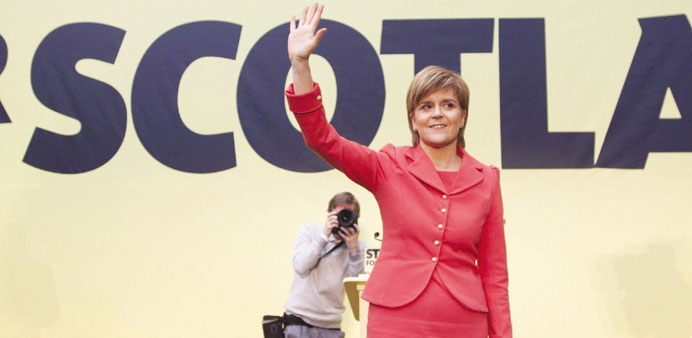Scotland’s pro-independence First Minister Nicola Sturgeon waves at the launch of the Scottish National Party (SNP) election manifesto in Edinburgh yesterday.
Reuters/Edinburgh/London
The Scottish National Party yesterday set out plans for higher public spending, aiming to reverse five years of austerity measures as it goes into a close-run UK election with hopes of winning the power to broker the next British government.
Polls show neither Prime Minister David Cameron’s Conservatives nor the opposition Labour Party are likely to win an outright majority at the May 7 election, the outcome of which could influence whether Britain leaves the European Union or Scotland launches a fresh bid for independence.
The Scottish National Party (SNP), which has rebounded after leading a failed bid for independence last year, is on track to virtually wipe out Labour in Scotland.
That could see it become Britain’s third biggest party by seats, but SNP leader Nicola Sturgeon reassured voters outside of Scotland yesterday that she was seeking changes that would benefit the whole of the United Kingdom.
In the event of an inconclusive election result, the SNP hopes it will have a decisive say over who forms the next government and has said it will only do a deal with Labour.
Launching a manifesto that included backing for many Labour policies, Sturgeon said ending state spending cuts would be the SNP’s “number one priority.”
“It is time to end the needless pain,” she told an audience of SNP supporters in Edinburgh.
“In the last five years, austerity has undermined our public services, lowered the living standards of working people, pushed more children into poverty and held back economic growth.”
The SNP plans to free up £3bn a year for extra spending by scrapping the renewal of Britain’s Trident nuclear deterrent.
The Labour party, however, backs a renewal of Trident.
Labour leader Ed Miliband has ruled out a formal coalition with the SNP, but not a looser vote-by-vote arrangement.
The Conservatives are trying to sow concern among voters in the rest of the UK over a potential Labour-SNP partnership.
Defence Minister Michael Fallon described the SNP’s manifesto as “the most expensive ransom note in history” and Cameron warned a Labour-SNP deal would imperil the economic recovery. The prime minister also promised a Conservative government would ensure plans to devolve further powers to Scotland did not have a detrimental affect on other parts of the country.
Sturgeon is proposing an alternative to austerity, pitching real-term public spending increases of 0.5 percent per year in areas such as jobs, economic growth, and public services.
She argued that Cameron’s comments reflected “panic and desperation” and promised voters that her party was not seeking to wield a destructive influence in the British parliament.
Conservatives four points ahead of Labour: poll
Prime Minister David Cameron’s Conservatives have notched up a four point lead over the opposition Labour Party ahead of a May 7 election, an Ashcroft poll showed yesterday, the party’s largest lead in the polling series in six weeks. If replicated across the country in the election, the lead would not be enough to give the Conservatives an overall majority, however, and was within the margin of error. A week ago, the same poll had both parties neck-and-neck. The closeness of the race was underlined by two earlier polls yesterday, one of which had the Conservatives two points ahead while the other had the same lead for Labour. With no sign yet of a surge in support for either the Conservatives or Labour, polls indicate that a hung parliament is the most likely outcome, potentially handing the role of king maker to the leader of a smaller party, such as the Scottish National Party or Liberal Democrats. Yesterday’s poll, funded by Michael Ashcroft, a former deputy chairman of the Conservatives, put Cameron’s party on 34%, up 1 point since last week, and Labour down three points on 30%.

